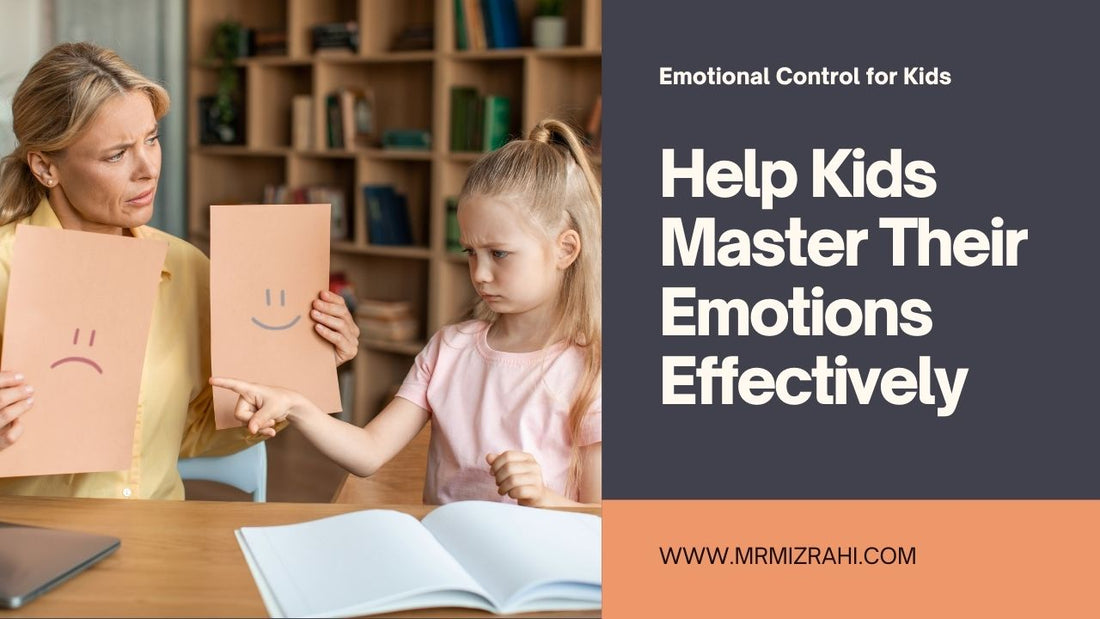
Helping Kids Develop Emotional Control
Share
Emotional control is a skill we all develop over time, but for children, it plays a crucial role in their confidence, relationships, and overall well-being. As kids grow, they experience a wide range of emotions—happiness, frustration, excitement, disappointment—and learning how to manage these feelings is essential. With the right guidance, they can express themselves in healthy ways, cope with challenges, and build strong emotional resilience.
Why Emotional Control Matters
Emotional control isn’t about suppressing feelings—it’s about understanding them, expressing them appropriately, and navigating life’s ups and downs with confidence. When children learn to regulate their emotions, they’re better equipped to:
- Express feelings in words rather than actions
- Show empathy toward others
- Stay calm in stressful situations
- Cope with fears and uncertainties
- Handle disappointment and frustration in healthy ways
- Develop self-confidence and strong communication skills
These skills not only help kids manage everyday challenges but also contribute to their success in school, friendships, and family life.
How Emotional Development Unfolds
Children begin developing emotional awareness at an early age. Babies express basic emotions like joy, sadness, and frustration through cries, giggles, and facial expressions. As toddlers, they start recognizing emotions in others and learning how to respond. By the preschool years, kids begin using words to describe their feelings and regulate their reactions—though they still need guidance.
As children grow, their ability to control emotions depends on several factors, including:
- Parental Influence: Kids learn emotional control by watching how parents and caregivers handle their own emotions.
- Social Interactions: Friendships, family relationships, and school experiences help shape emotional skills.
- Personality and Temperament: Some children naturally manage emotions better than others, but all can improve with practice and support.
Strategies to Help Kids Build Emotional Control
As parents and caregivers, you play a key role in helping children manage emotions. Here are some effective strategies to support their development:
1. Model Emotional Regulation
Children learn by example. When you openly talk about your feelings and demonstrate healthy coping strategies, they’ll follow your lead. For instance, if you’re frustrated, you might say, “I’m feeling a little overwhelmed right now, so I’m going to take a deep breath before I respond.”
2. Encourage Them to Express Feelings in Words
Help your child name their emotions. Instead of acting out when frustrated, they can learn to say, “I feel upset because my toy broke.” A feelings chart or simple emotion words like happy, sad, frustrated, or excited can be useful for younger children.
3. Teach Coping Strategies
Equip kids with tools to manage strong emotions. Breathing exercises, counting to ten, squeezing a stress ball, or taking a break can help them calm down before reacting. Over time, they’ll learn to apply these techniques on their own.
4. Provide a Safe Space for Expression
Encourage open conversations about feelings. Create a supportive environment where your child feels comfortable discussing what’s on their mind without fear of judgment or punishment.
5. Practice Problem-Solving Together
When kids face challenges, guide them in thinking through solutions rather than reacting impulsively. For example, if they’re upset about a lost toy, ask, “What do you think we can do to solve this?”
6. Use Games and Activities to Build Emotional Skills
Board games that require patience, such as “Chess” or “Chutes and Ladders,” can help children practice impulse control. Role-playing different scenarios can also teach them how to handle tough situations in a safe and fun way.
The Long-Term Benefits of Emotional Control
Children who develop emotional regulation skills tend to experience:
- Better focus and academic performance
- Healthier friendships and family relationships
- Greater resilience in handling life’s challenges
- Reduced risk of anxiety and behavioral issues
Emotional development is a lifelong journey, and every child progresses at their own pace. As a parent, your patience, encouragement, and guidance will help shape their ability to navigate emotions with confidence and ease. By fostering emotional control early on, you’re giving your child a valuable tool that will benefit them well into adulthood.
Coach Benjamin Mizrahi. Educator. Learning Specialist. Family Coach. Father. Husband.
More articles on EXECUTIVE FUNCTIONS COACHING – Benjamin Mizrahi
